Serving 579 students in grades Prekindergarten-5, Clubview Elementary School ranks in the top 50% of all schools in Georgia for overall test scores (math proficiency is top 50%, and reading proficiency is top 50%).
The percentage of students achieving proficiency in math is 42% (which is higher than the Georgia state average of 37%). The percentage of students achieving proficiency in reading/language arts is 46% (which is higher than the Georgia state average of 40%).
The student:teacher ratio of 15:1 is higher than the Georgia state level of 14:1.
Minority enrollment is 55% of the student body (majority Black), which is lower than the Georgia state average of 65% (majority Black).
Quick Stats (2025)
- Grades: Prekindergarten-5
- Enrollment: 579 students
- Student:Teacher Ratio: 15:1
- Minority Enrollment: 55%
- Overall Testing Rank: Top 50% in GA
- Math Proficiency: 42% (Top 50%)
- Reading Proficiency: 46% (Top 30%)
- Science Proficiency: 40-44% (Top 50%)
- Source: National Center for Education Statistics (NCES), GA Dept. of Education
Top Rankings
Clubview Elementary School ranks among the top 20% of public schools in Georgia for:
Category
Attribute
Diversity
School Overview
Clubview Elementary School's student population of 579 students has grown by 12% over five school years.
The teacher population of 38 teachers has grown by 15% over five school years.
Grades Offered
Grades Prekindergarten-5
Total Students
579 students
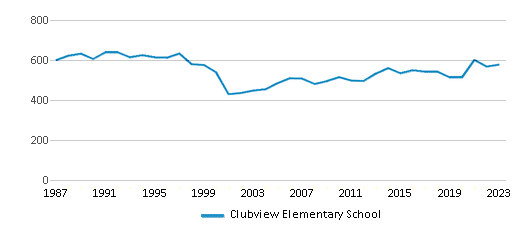
Gender %
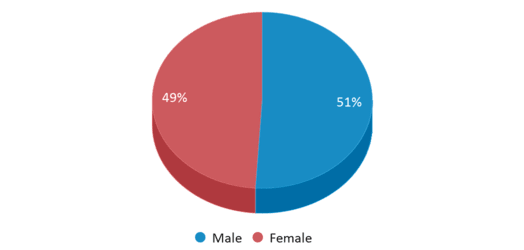
Total Classroom Teachers
38 teachers
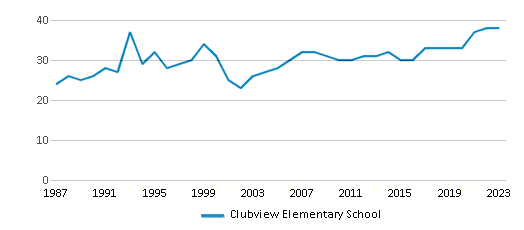
Students by Grade
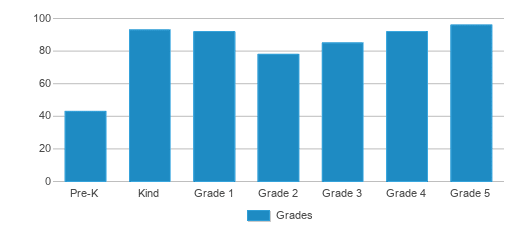
School Rankings
Clubview Elementary School ranks within the top 50% of all 2,204 schools in Georgia (based off of combined math and reading proficiency testing data).
The diversity score of Clubview Elementary School is 0.68, which is less than the diversity score at state average of 0.71. The school's diversity has stayed relatively flat over five school years.
Overall Testing Rank
#706 out of 2204 schools
(Top 50%)
(Top 50%)
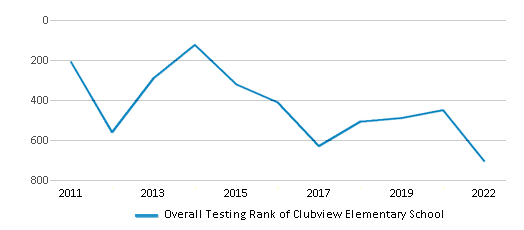
Math Test Scores (% Proficient)
42%
37%
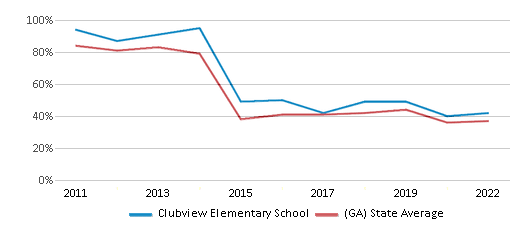
Reading/Language Arts Test Scores (% Proficient)
46%
40%
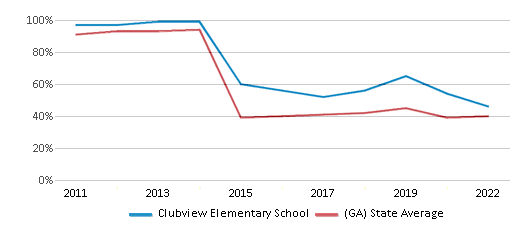
Science Test Scores (% Proficient)
40-44%
40%
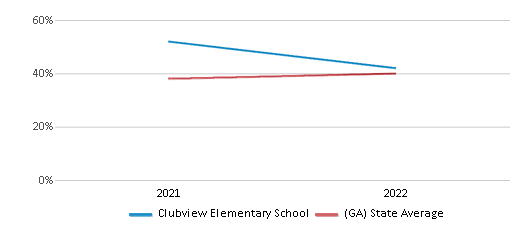
Student : Teacher Ratio
15:1
14:1
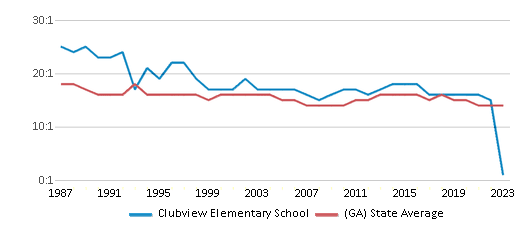
American Indian
n/a
n/a
Asian
2%
5%
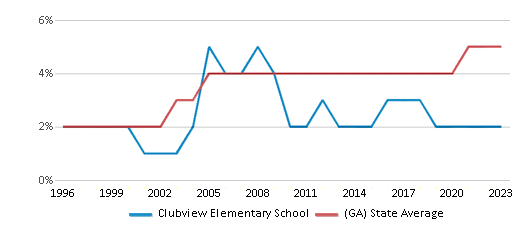
Hispanic
11%
19%
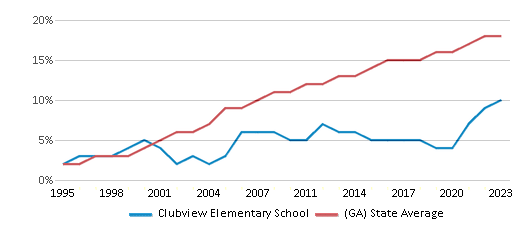
Black
31%
36%
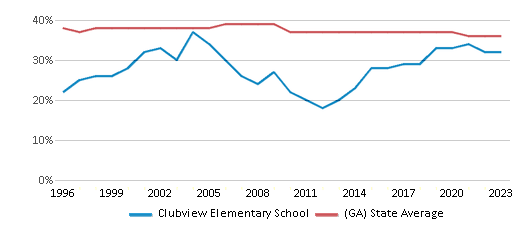
White
45%
35%
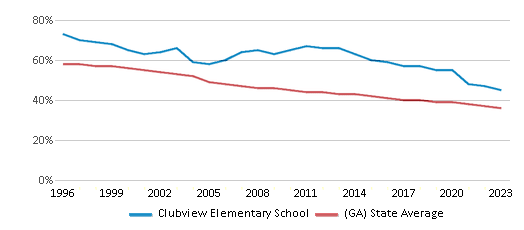
Hawaiian
n/a
n/a
Two or more races
11%
5%
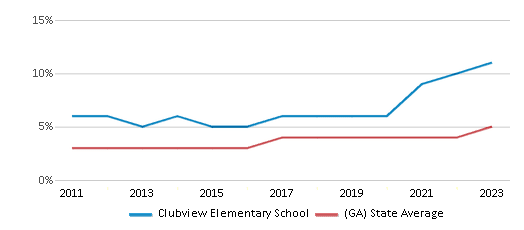
All Ethnic Groups
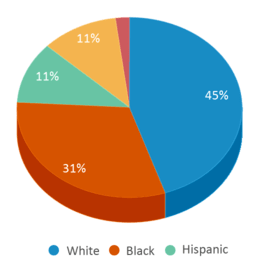
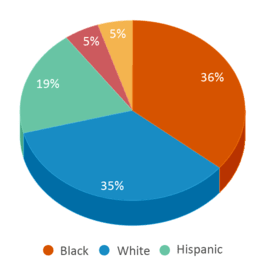
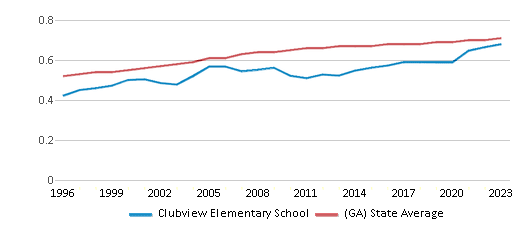
Participates in the National School Lunch Program (NSLP)
Yes
Eligible for Free Lunch
42%
59%
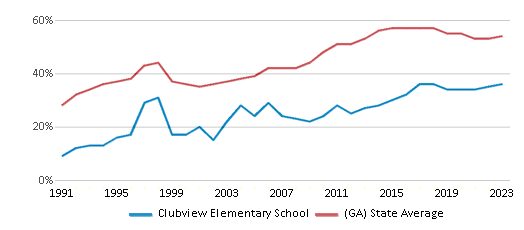
Eligible for Reduced Lunch
6%
5%
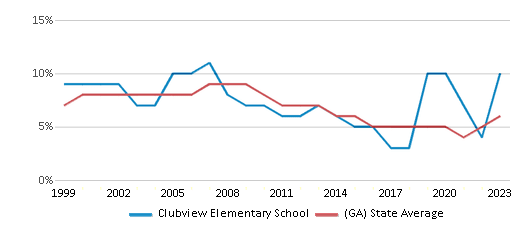
School Statewide Testing
School District Name
Source: National Center for Education Statistics (NCES), GA Dept. of Education
Profile last updated: 02/09/2025
Frequently Asked Questions
What is Clubview Elementary School's ranking?
Clubview Elementary School is ranked #706 out of 2,204 schools, which ranks it among the top 50% of public schools in Georgia.
What schools are Clubview Elementary School often compared to?
Clubview Elementary Schoolis often viewed alongside schools like Eagle Ridge Academy by visitors of our site.
What percent of students have achieved state testing proficiency in math and reading?
42% of students have achieved math proficiency (compared to the 37% GA state average), while 46% of students have achieved reading proficiency (compared to the 40% GA state average).
How many students attend Clubview Elementary School?
579 students attend Clubview Elementary School.
What is the racial composition of the student body?
45% of Clubview Elementary School students are White, 31% of students are Black, 11% of students are Hispanic, 11% of students are Two or more races, and 2% of students are Asian.
What is the student:teacher ratio of Clubview Elementary School?
Clubview Elementary School has a student ration of 15:1, which is higher than the Georgia state average of 14:1.
What grades does Clubview Elementary School offer ?
Clubview Elementary School offers enrollment in grades Prekindergarten-5
What school district is Clubview Elementary School part of?
Clubview Elementary School is part of Muscogee County School District.
School Reviews
5 3/3/2009
Clubview offers a challenging and stimulating curriculum. The focus of instruction is to develop knowledgeable, independent citizens of a global community. Clubview uses inquiry based learning and the latest technology to equip students to take charge of their own learning. Students are provided with a variety of clubs and activities such as manners class, musical theater, Spanish class and French club. The facility is inviting and on the walls of every hall you can see what children are learning in a variety of creative displays. Visit Clubview and you will be impressed by the relaxed atmosphere and the enthusiasm for learning that is evident in all of the smiling faces of students. Parent involvement is excellent with very strong participation in PTA. Parents sign a contract where they pledge to support the learning process by helping with projects throughout the year. Clubview has given my children the desire to take risks and the skills to be independent learners. It's a beautiful place to learn and grow.
Review Clubview Elementary School. Reviews should be a few sentences in length. Please include any comments on:
- Quality of academic programs, teachers, and facilities
- Availability of music, art, sports and other extracurricular activities
Recent Articles

What Is A Charter School?
Explore the world of charter schools in this comprehensive guide. Learn about their history, how they operate, and the pros and cons of this educational innovation. Discover key facts about charter schools, including admission policies, demographics, and funding, as well as what to look for when considering a charter school for your child.

10 Reasons Why High School Sports Benefit Students
Discover the 10 compelling reasons why high school sports are beneficial for students. This comprehensive article explores how athletics enhance academic performance, foster personal growth, and develop crucial life skills. From improved fitness and time management to leadership development and community representation, learn why participating in high school sports can be a game-changer for students' overall success and well-being.

February 05, 2025
Understanding the U.S. Department of Education: Structure, Impact, and EvolutionWe explore how the Department of Education shapes American education, from its cabinet-level leadership to its impact on millions of students, written for general audiences seeking clarity on this vital institution.









